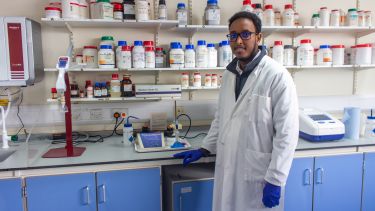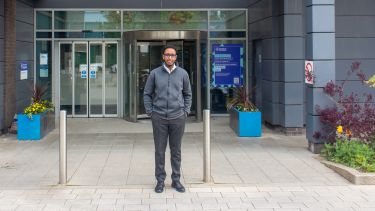The course is taught by experts in endocrinology and diabetes

What made you choose to study Clinical Endocrinology and Diabetes at Sheffield?
“As someone with a background in the medical field, specialising in the field of endocrinology and diabetes has always been a dream and a passion of mine. I’m fascinated by the complexity of hormones and how they relate to various body processes in the human body. Hormones affect every other system in the body, so they’re a crucial aspect of medical care. Small changes in hormonal regulation can lead to fatal disorders. This has further fuelled my interest in the field.
“I decided to study at the University of Sheffield because of its reputation as a leading institution in this field, and the fact the course is taught by experts in endocrinology and diabetes.”
What are you enjoying most about studying at Sheffield?
“The first time I visited the UK was to start this course in Sheffield. The first days were difficult as I didn’t know anyone else, but later I found out Sheffield has a lot of students and it feels like you’re living together in a community. The city also has great landscapes; I live close to the Botanical Gardens which is a great spot for students.
“As for the course, I’m currently enjoying the research project the most, as it’s allowed me to apply what I’ve learnt in a practical setting and develop my research skills. I’m attached to the Sheffield Teaching Hospitals where I’m conducting a real-world evaluation of Opsite topical dressing for painful diabetic neuropathy as part of my research project. This is a dressing which is usually used in clinics or in hospitals for wound care, but we’re looking at its effectiveness in the real world in relieving pain for this group of patients. There’s currently no licensed treatments for painful diabetic neuropathy. I’m gathering patient data and analysing the outcomes after their utilisation of the intervention. The initial findings from the first four weeks of feedback are encouraging and showing promising results. My project supervisor is really friendly and approachable. We meet every week and I know if I have a problem then he’ll be very supportive.
“You also get the opportunity to meet a lot of experts and build a professional network of clinicians renowned in the field. There are multi-disciplinary meetings, in which real-life cases are discussed regarding best management of patients with a range of endocrine conditions. I got the incredible opportunity to attend these meetings, which was a great chance to meet experts from across the field of endocrinology.”
What knowledge and skills have you developed on the course?
“I have had the opportunity to generate a grant proposal for a long-acting hormone designed to treat an endocrine condition, and engage in hands-on laboratory sessions where I’ve learned essential techniques in the drug discovery pathway. These practical sessions not only allowed me to conduct experiments and analyse data, but also encouraged me to critically discuss my findings in relation to existing literature and lecture content. This has enhanced my skills and knowledge for future research endeavours.
The other great part of the course is that it doesn’t just focus on endocrinology in adults. The course combines both adult and paediatric endocrinology as separate modules. I have got an honorary clinical observer contract with Sheffield Children’s Hospital and Sheffield Teaching Hospitals as part of my course. It’s been really beneficial to me to get that broad spectrum of knowledge, but it would also be of particular interest to scientists who don’t have a clinical background.
Khalid Abdirahman
What are your career aspirations once you graduate, and how do you think the course will help you achieve this?
“After the course my aim is to conduct further research in endocrinology and diabetes while specialising my clinical practice within the NHS. The MSc is great at giving you the balance between clinical knowledge and research knowledge. It’s research focused, but I’ve also been given the opportunity to attend clinics across Sheffield Teaching Hospitals, and sit with consultants within clinical endocrinology and experience patient-doctor interactions. As a result, I’ll become a specialist in this field, but also a scientist in this area of research.”

International postgraduate taught scholarships
We offer a generous package of financial support for international postgraduate taught students, including scholarships worth £10,000 towards the original tuition fee.
Applications are open for existing offer holders for a postgraduate taught programme starting in September 2025.


